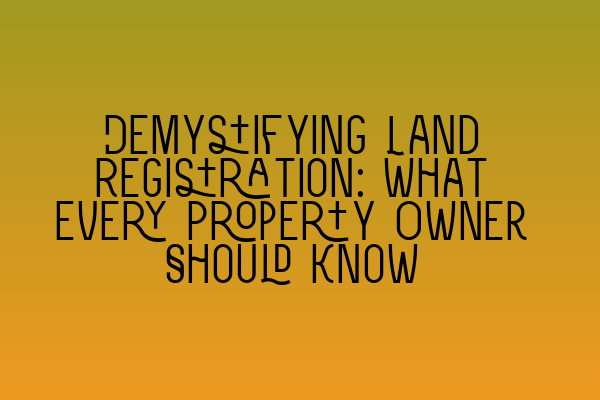Demystifying Land Registration: What Every Property Owner Should Know
In the world of property ownership and transactions, the concept of land registration plays a crucial role. It serves as a means to secure and protect property rights, providing clarity and transparency to property owners. However, the process of land registration can often be complex and intimidating for many property owners.
At SQE Property Law & Land Law, we understand the importance of demystifying land registration and ensuring that property owners have a clear understanding of the process. In this article, we will provide you with a comprehensive guide to land registration, covering everything you need to know as a property owner.
What is Land Registration?
Land registration, in simple terms, is the process of recording and documenting the ownership and interests in a particular piece of land. It involves the creation of an official record, known as the land register, which acts as evidence of ownership and any rights or interests that may exist.
The land register is maintained by the Land Registry in the United Kingdom, and it provides an accurate and up-to-date record of ownership and any charges or restrictions that may affect the property.
Why is Land Registration Important?
Land registration is vital for several reasons:
- Proof of Ownership: The land register serves as proof of ownership, providing conclusive evidence of title. It protects property owners from disputes and claims on their land by establishing a clear record of ownership.
- Clarity and Transparency: Land registration offers clarity and transparency to property owners, as it provides a comprehensive record of any rights or interests that may affect the property, such as leases, easements, or covenants.
- Facilitates Property Transactions: Land registration simplifies property transactions by ensuring that all relevant information about the property is readily available. It streamlines the conveyancing process and provides confidence to buyers and lenders.
- Protection Against Fraud: Land registration helps in preventing and detecting fraudulent activities related to property ownership. The Land Registry maintains strict procedures to verify the identity of individuals involved in property transactions, reducing the risk of fraud.
Now that we understand the importance of land registration let’s explore the process in more detail.
The Process of Land Registration
The process of land registration typically involves the following steps:
- Application: The first step is to complete an application for land registration. This application is submitted to the Land Registry, along with any necessary supporting documents and fees.
- Examination: The Land Registry examines the application and verifies the details provided. They check for any errors or inconsistencies and request any additional information if required.
- Official Search: The Land Registry conducts an official search to ensure that there are no undisclosed interests or charges affecting the property. This search includes checking for any liens, mortgages, or other encumbrances.
- Issue of Title: Once the application has been approved and all necessary checks are completed, the Land Registry issues a title certificate. This certificate acts as conclusive evidence of ownership.
It is important to note that the land registration process may vary depending on the circumstances, such as whether the property is being sold, remortgaged, or transferred.
Common Mistakes to Avoid in Land Registration
While land registration is an essential process, there are certain common mistakes that property owners should be aware of and avoid:
- Failing to Register: One common mistake is failing to register the property. It is crucial to register the property as soon as possible to establish a clear record of ownership and protect against any potential claims.
- Inaccurate Information: Providing inaccurate or incomplete information in the application can lead to delays and complications in the land registration process. It is essential to ensure that all details are correct and supported by appropriate evidence.
- Not Updating the Register: Property owners should promptly update the land register whenever there are changes in ownership, such as sales, transfers, or inheritances. Failure to do so can result in confusion and potential disputes.
By avoiding these common mistakes, property owners can ensure a smooth and hassle-free land registration process.
Conclusion
Land registration is a crucial aspect of property ownership, providing clarity, transparency, and protection to property owners. Understanding the process and avoiding common pitfalls is essential for a seamless experience.
At SQE Property Law & Land Law, we specialize in providing expert advice and assistance in all areas of property law, including land registration. If you require any assistance or have any questions, feel free to contact us.
For more information on related topics, you may find the following articles helpful:
- Updates in UK Property Laws: Key Changes and Implications
- Legal challenges in property transactions: A comprehensive guide
- Dominate Property Law Questions: Avoiding Common Pitfalls
- Land Law Revision Tips: Ace Your Exam Preparation
- Mortgages and land law: Essential considerations for property transactions
